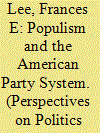| Srl | Item |
| 1 |
ID:
117471


|
|
|
|
|
| Publication |
2012.
|
| Summary/Abstract |
JAMES G.GIMPEL, FRANCES E.LEE, and REBECCA U.THORPE investigate why the American Recovery and Reinvestment Act of 2009 did not always focus additional resources on areas where the recession's downturn was most severe. They examine whether funds were allocated according to pork barrel politics or instead via "policy windows" through which advocates steered a diverse group of programs long desired for reasons unrelated to the recession. They find some support for both theories, but policy window effects were more important than pork barrel politics in accounting for distributional outcomes.
|
|
|
|
|
|
|
|
|
|
|
|
|
|
|
|
| 2 |
ID:
165849


|
|
|
|
|
| Summary/Abstract |
Majority leaders of the contemporary Congress preside over parties that are more cohesive than at any point in the modern era, and power has been centralized in party leadership offices. Do today’s majority parties succeed in enacting their legislative agendas to a greater extent than the less-cohesive parties of earlier eras? To address this question, we examine votes on all laws enacted from 1973–2016, as well as on the subset of landmark laws identified by Mayhew. In addition, we analyze the efforts of congressional majority parties to pass their agendas from 1985 to 2016. We find that enacting coalitions in recent congresses are nearly as bipartisan as they were in the 1970s. Most laws, including landmark enactments, continue to garner substantial bipartisan support. Furthermore, majority parties have not gotten better at passing their legislative programs. Contemporary congressional majorities actually fail on their agenda items at somewhat higher rates than the less-cohesive majority parties of the 1980s and 1990s. When majority parties succeed on their agenda priorities, they usually do so with support from a majority of the minority party in at least one chamber and with the endorsement of one or more of the minority party’s top leaders.
|
|
|
|
|
|
|
|
|
|
|
|
|
|
|
|
| 3 |
ID:
172882


|
|
|
|
|
| Summary/Abstract |
Does populism threaten American democracy, and if so, what is the nature of that threat? In dialogue with the comparative literature on populism, this article considers the opportunity structure available to populist parties and candidates in the American political system. I argue that compared to most other democracies, the US system offers much less opportunity for organized populist parties but more opportunity for populist candidacies. Today’s major parties may also be more vulnerable to populist insurgency than at other points in US history because of (1) changes in communications technology, (2) the unpopularity of mainstream parties and party leaders, and (3) representation gaps created by an increasingly racialized party system. Although no democratic system is immune to deterioration, the US constitutional system impedes authoritarian populism, just as it obstructs party power generally. But the vulnerability of the major parties to populist insurgency poses a threat to liberal democratic norms in the United States, just as it does elsewhere.
|
|
|
|
|
|
|
|
|
|
|
|
|
|
|
|
| 4 |
ID:
096374


|
|
|
|
|
| Publication |
2010.
|
| Summary/Abstract |
Current circumstances might seem to present real opportunities for Congress to reassert itself relative to its weakened role during George W. Bush's presidency. Large, unusually cohesive Democratic majorities in both chambers; unified government; and an administration staffed with people who know Congress well-all this might lead one to expect a productive working relationship permitting Congress wide scope of action. Nevertheless, the Senate's internal deliberative processes threaten to create difficulties so significant that they may outweigh these developments. Looking to the future of Congress, changes in Senate procedures and practices are important not only because of their effects on the institution's internal power structure. Left unchecked, they are also likely to have implications for the balance of power between the executive and legislative branches of government.
|
|
|
|
|
|
|
|
|
|
|
|
|
|
|
|